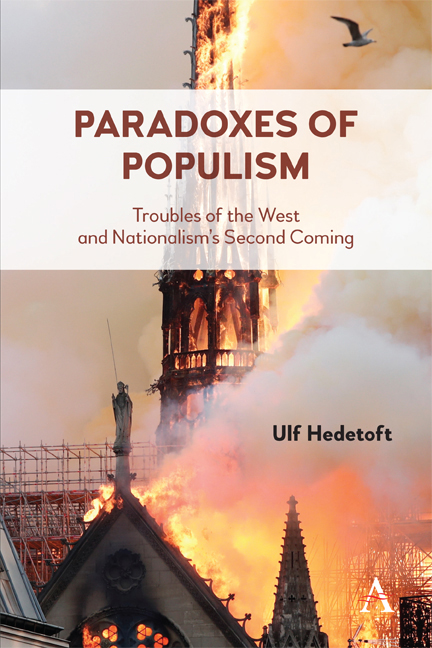Book contents
- Frontmatter
- Contents
- Acknowledgments
- 1 Introduction
- 2 What Is the Problem?
- 3 The People and Popular Sovereignty. Back to Basics, and Onward …
- 4 The Nationalization of the People
- 5 Fantasies and Paradoxes of Populism
- 6 Myths and Misconceptions
- 7 Sweden-Intransigent Moralities at War in the Peopleâs Home
- 8 Catalonia-Toward a State Truly Our Own!
- 9 Hungary-Righteous Revenge for Historic Humiliations
- 10 Brexit-Between Despair and Delusion
- 11 The United States-Normalizing a Superpower by Abnormal Means
- 12 Extractions and Perspectives
- References
- Index
8 - Catalonia-Toward a State Truly Our Own!
Published online by Cambridge University Press: 02 April 2020
- Frontmatter
- Contents
- Acknowledgments
- 1 Introduction
- 2 What Is the Problem?
- 3 The People and Popular Sovereignty. Back to Basics, and Onward …
- 4 The Nationalization of the People
- 5 Fantasies and Paradoxes of Populism
- 6 Myths and Misconceptions
- 7 Sweden-Intransigent Moralities at War in the Peopleâs Home
- 8 Catalonia-Toward a State Truly Our Own!
- 9 Hungary-Righteous Revenge for Historic Humiliations
- 10 Brexit-Between Despair and Delusion
- 11 The United States-Normalizing a Superpower by Abnormal Means
- 12 Extractions and Perspectives
- References
- Index
Summary
If the state fails to assimilate its national minorities, and they perceive the state as “alien”, the “estrangement” from the state implies a profound sense of emotional detachment. The individual feels as a “stranger” and thus can easily develop a strong sense of community with those members of the national community determined to oppose the homogenizing processes initiated by the state. In opposition to the majority nationalism instilled by the state, emerges a novel resistance nationalism defending the right of national minorities to decide upon their political future. (Montserrat Guibernau 2013, 9)
The Catalonian case is very different from the Swedish, for a number of obvious reasons. Sweden is a unitary nation- state, based on cultural homogeneity and a long shared history, but with ethnic and national minorities of different hue (Sami, Swedish Finns, Serbs, Croats, Turks, Romanians, Syrians, etc.). Most of these are geographically dissipated across Swedish territory, though the Sami have their own distinct “homeland” in the North. Catalonia, on the other hand, though also located within a formally unitary Spanish state, is an autonomous region within the national “semi- federal” structure, with its own language (Catalan), a relatively distinct history and devolved powers in questions of language, education, social policy and culture, but— in spite of this considerable political autonomy— is not equipped with the powers that uniquely distinguish a sovereign nation- state: money, foreign policy, security forces, an army and international recognition. And, importantly, it never was, in spite of multiple historical efforts (Elliott 2018; Guibernau 2004).
Its autonomous status has, moreover, shifted a lot since the fall of Franco in 1975 (the fascist regime did not admit of any autonomy at all). Autonomy peaked in 2006, but in 2010 the region had significant competences removed from the regional government in Barcelona to the central government in Madrid, based on a decision by the Spanish Constitutional Court— an event that refueled and aggravated the secessionist debate. Gerardo Munoz (2018) is right to argue that
if the 2011 protest cycle of 15- M indignados movement1 made the crisis of legitimacy of the Spanish democratic consensus visible, the Catalan independence movement places the Spanish state at a high point of existential threat. There is no doubt that in both the intermediate and long term, the “Catalan Question” will fundamentally redefine the Spanish political landscape as well as the future of the European zone.
- Type
- Chapter
- Information
- Paradoxes of PopulismTroubles of the West and Nationalism's Second Coming, pp. 99 - 112Publisher: Anthem PressPrint publication year: 2020



